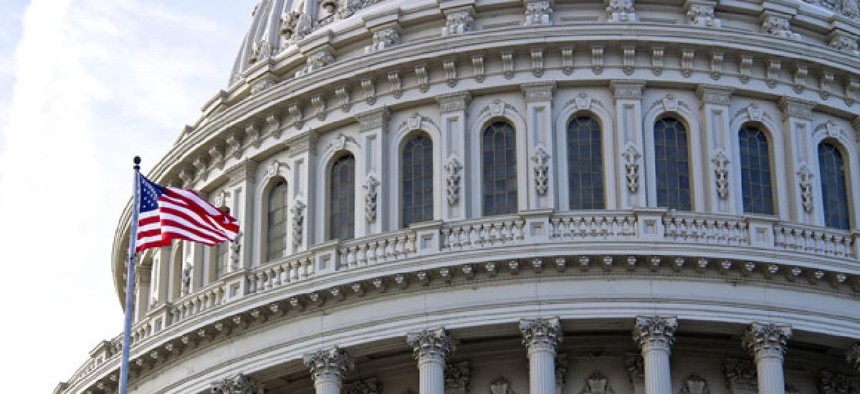
Mesut Dogan/Shutterstock.com
Senate Approves 2013 Spending Bill to Keep Government Open
House is warming to the plan, which extends the federal pay freeze and includes amendments to selectively ease sequestration.
The Senate on Wednesday voted 73-26 to pass an amended version of the fiscal 2013 bill to keep the government running past the March 27 expiration date of last year’s continuing resolution. The legislation would extend the freeze on federal pay.
The plan to fund most agencies at fiscal 2012 levels includes $85 billion in cuts under sequestration, but the Senate agreed to several adjustments to ease the pain selectively, and the House is expected to respond positively and may vote on the bill Thursday.
The amendments would make adjustments in programs affecting furloughs of food inspectors, military tuition reimbursements, National Science Foundation funding and reports to Congress from the Homeland Security Department.
Majority Leader Harry Reid, D-Nev., who was eager to move the catchall spending bill early this week to make time for a long debate on fiscal 2014 budget resolutions, had to deal with a rebellion by several Republicans seeking a chance to offer amendments to ease sequestration on specific programs and agencies. The prime objector was Sen. Jerry Moran, R-Kan., who sought, unsuccessfully, to have a vote on moving funds to avoid having air traffic control towers in Kansas close because of across-the-board spending cuts.
“I was amazed yesterday when Senate Republicans blocked attempts to begin debate on the Senate budget resolution,” Reid said. “Republicans said they wanted to debate and pass a budget. Well, here was their chance. Yet the junior senator from Kansas, Sen. Moran, objected to a request to begin debating the budget unless we vote on his proposed amendment to the continuing resolution.”
Jabbing Republicans who accepted the sequestration rather than accept tax hikes, Reid added, “We are all concerned about the sequester. That is why the Senate Democratic budget proposal actually reverses the sequester.”
Coburn rebutted Reid by saying, “The reason my colleagues want the sequester to hurt is because they can’t rationalize a bigger government” and want to send a message that it can’t be cut, he said. “There’s a major philosophical divide,” and the result of allowing few amendments “is to allow the administration to make sequestration as painful as it can be.”
Before clearing the $984-billion spending package to fund the government through Sept. 30, the Senate accepted several amendments and rejected others, all of which, by agreement, required 60 votes to pass.
It accepted, by voice vote, an amendment by Sens. Roy Blunt, R-Mo., and Mark Pryor, D-Ark., to add funds for the Food Safety and Inspection Service so that none are furloughed due to sequestration.
Also by voice vote, the Senate accepted an amendment by Sens. James Inhofe, R-Okla., and Kay Hagan, D-N.C., to restore tuition reimbursement benefits to military service people, a program that was trimmed under sequestration.
It agreed by voice vote to accept a Coburn amendment to redirect National Science Foundation research grant funds away from “political science” and toward cancer research.
Another Coburn amendment, to require all Homeland Security Department reports that go to the Senate Appropriations Committee also to go the Homeland Security and Governmental Affairs panel, also passed by voice vote.
The Senate rejected, 40-59, an amendment by Sen. Pat Toomey, R-Pa., that would have eased sequestration on the Pentagon by moving $60 billion of military investments in biofuels into accounts for operations and maintenance, which Defense planners consider shortchanged by the across-the-board cuts.
Senators rejected, 48-51, a Coburn amendment to prohibit the Homeland Security Department’s Urban Area Security Initiative grants that don’t contribute to homeland security. It rejected, 45-54, a Coburn amendment to shift funds from the National Heritage Partnership Program for parks and give to other Park Service accounts to permit resumption of the suspended tourist tours of the White House.
And before the voting started, Democratic leaders rejected a request for a floor vote on an amendment by Sen. Kelly Ayotte, R-N.H., to shift $380 million from the Pentagon’s Medium Extended Air Defense System, which she called a “missile to nowhere.”
(Image via Mesut Dogan/Shutterstock.com)
NEXT STORY: Bill Granting GAO More Power Passes House Panel







